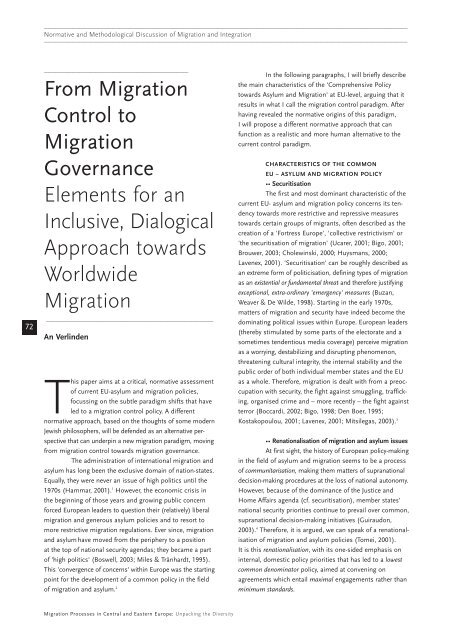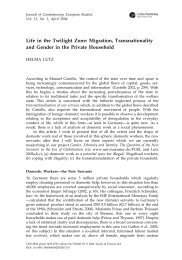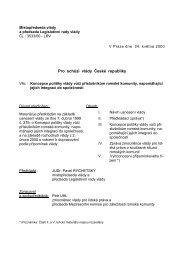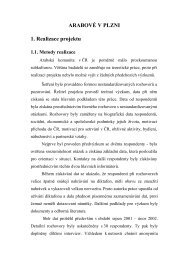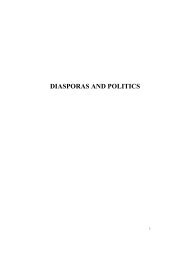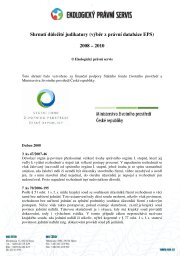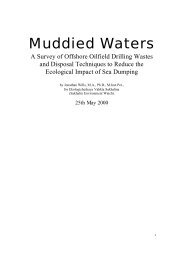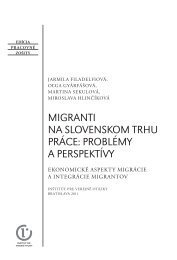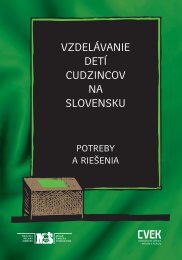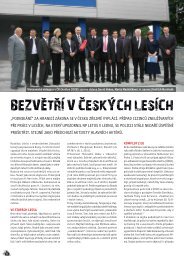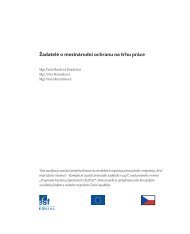Migration Processes in Central and Eastern Europe - Multiple Choices
Migration Processes in Central and Eastern Europe - Multiple Choices
Migration Processes in Central and Eastern Europe - Multiple Choices
Create successful ePaper yourself
Turn your PDF publications into a flip-book with our unique Google optimized e-Paper software.
———————————————————————————————————————————————————————————————<br />
Normative <strong>and</strong> Methodological Discussion of <strong>Migration</strong> <strong>and</strong> Integration<br />
———————————————————————————————————————————————————————————————<br />
72<br />
—————————————————————————<br />
From <strong>Migration</strong><br />
Control to<br />
<strong>Migration</strong><br />
Governance<br />
Elements for an<br />
Inclusive, Dialogical<br />
Approach towards<br />
Worldwide<br />
<strong>Migration</strong><br />
—————————————————————————————<br />
An Verl<strong>in</strong>den<br />
This paper aims at a critical, normative assessment<br />
of current EU-asylum <strong>and</strong> migration policies,<br />
focuss<strong>in</strong>g on the subtle paradigm shifts that have<br />
led to a migration control policy. A different<br />
normative approach, based on the thoughts of some modern<br />
Jewish philosophers, will be defended as an alternative perspective<br />
that can underp<strong>in</strong> a new migration paradigm, mov<strong>in</strong>g<br />
from migration control towards migration governance.<br />
The adm<strong>in</strong>istration of <strong>in</strong>ternational migration <strong>and</strong><br />
asylum has long been the exclusive doma<strong>in</strong> of nation-states.<br />
Equally, they were never an issue of high politics until the<br />
1970s (Hammar, 2001). 1 However, the economic crisis <strong>in</strong><br />
the beg<strong>in</strong>n<strong>in</strong>g of those years <strong>and</strong> grow<strong>in</strong>g public concern<br />
forced <strong>Europe</strong>an leaders to question their (relatively) liberal<br />
migration <strong>and</strong> generous asylum policies <strong>and</strong> to resort to<br />
more restrictive migration regulations. Ever s<strong>in</strong>ce, migration<br />
<strong>and</strong> asylum have moved from the periphery to a position<br />
at the top of national security agendas; they became a part<br />
of 'high politics' (Boswell, 2003; Miles & Tränhardt, 1995).<br />
This 'convergence of concerns' with<strong>in</strong> <strong>Europe</strong> was the start<strong>in</strong>g<br />
po<strong>in</strong>t for the development of a common policy <strong>in</strong> the field<br />
of migration <strong>and</strong> asylum. 2<br />
In the follow<strong>in</strong>g paragraphs, I will briefly describe<br />
the ma<strong>in</strong> characteristics of the 'Comprehensive Policy<br />
towards Asylum <strong>and</strong> <strong>Migration</strong>' at EU-level, argu<strong>in</strong>g that it<br />
results <strong>in</strong> what I call the migration control paradigm. After<br />
hav<strong>in</strong>g revealed the normative orig<strong>in</strong>s of this paradigm,<br />
I will propose a different normative approach that can<br />
function as a realistic <strong>and</strong> more human alternative to the<br />
current control paradigm.<br />
CHARACTERISTICS OF THE COMMON<br />
EU – ASYLUM AND MIGRATION POLICY<br />
•• Securitisation<br />
The first <strong>and</strong> most dom<strong>in</strong>ant characteristic of the<br />
current EU- asylum <strong>and</strong> migration policy concerns its tendency<br />
towards more restrictive <strong>and</strong> repressive measures<br />
towards certa<strong>in</strong> groups of migrants, often described as the<br />
creation of a 'Fortress <strong>Europe</strong>', 'collective restrictivism' or<br />
'the securitisation of migration' (Ucarer, 2001; Bigo, 2001;<br />
Brouwer, 2003; Cholew<strong>in</strong>ski, 2000; Huysmans, 2000;<br />
Lavenex, 2001). 'Securitisation' can be roughly described as<br />
an extreme form of politicisation, def<strong>in</strong><strong>in</strong>g types of migration<br />
as an existential or fundamental threat <strong>and</strong> therefore justify<strong>in</strong>g<br />
exceptional, extra-ord<strong>in</strong>ary 'emergency' measures (Buzan,<br />
Weaver & De Wilde, 1998). Start<strong>in</strong>g <strong>in</strong> the early 1970s,<br />
matters of migration <strong>and</strong> security have <strong>in</strong>deed become the<br />
dom<strong>in</strong>at<strong>in</strong>g political issues with<strong>in</strong> <strong>Europe</strong>. <strong>Europe</strong>an leaders<br />
(thereby stimulated by some parts of the electorate <strong>and</strong> a<br />
sometimes tendentious media coverage) perceive migration<br />
as a worry<strong>in</strong>g, destabiliz<strong>in</strong>g <strong>and</strong> disrupt<strong>in</strong>g phenomenon,<br />
threaten<strong>in</strong>g cultural <strong>in</strong>tegrity, the <strong>in</strong>ternal stability <strong>and</strong> the<br />
public order of both <strong>in</strong>dividual member states <strong>and</strong> the EU<br />
as a whole. Therefore, migration is dealt with from a preoccupation<br />
with security, the fight aga<strong>in</strong>st smuggl<strong>in</strong>g, traffick<strong>in</strong>g,<br />
organised crime <strong>and</strong> – more recently – the fight aga<strong>in</strong>st<br />
terror (Boccardi, 2002; Bigo, 1998; Den Boer, 1995;<br />
Kostakopoulou, 2001; Lavenex, 2001; Mitsilegas, 2003). 3<br />
•• Renationalisation of migration <strong>and</strong> asylum issues<br />
At first sight, the history of <strong>Europe</strong>an policy-mak<strong>in</strong>g<br />
<strong>in</strong> the field of asylum <strong>and</strong> migration seems to be a process<br />
of communitarisation, mak<strong>in</strong>g them matters of supranational<br />
decision-mak<strong>in</strong>g procedures at the loss of national autonomy.<br />
However, because of the dom<strong>in</strong>ance of the Justice <strong>and</strong><br />
Home Affairs agenda (cf. securitisation), member states'<br />
national security priorities cont<strong>in</strong>ue to prevail over common,<br />
supranational decision-mak<strong>in</strong>g <strong>in</strong>itiatives (Guiraudon,<br />
2003). 4 Therefore, it is argued, we can speak of a renationalisation<br />
of migration <strong>and</strong> asylum policies (Tomei, 2001).<br />
It is this renationalisation, with its one-sided emphasis on<br />
<strong>in</strong>ternal, domestic policy priorities that has led to a lowest<br />
common denom<strong>in</strong>ator policy, aimed at conven<strong>in</strong>g on<br />
agreements which entail maximal engagements rather than<br />
m<strong>in</strong>imum st<strong>and</strong>ards.<br />
<strong>Migration</strong> <strong>Processes</strong> <strong>in</strong> <strong>Central</strong> <strong>and</strong> <strong>Eastern</strong> <strong>Europe</strong>: Unpack<strong>in</strong>g the Diversity


